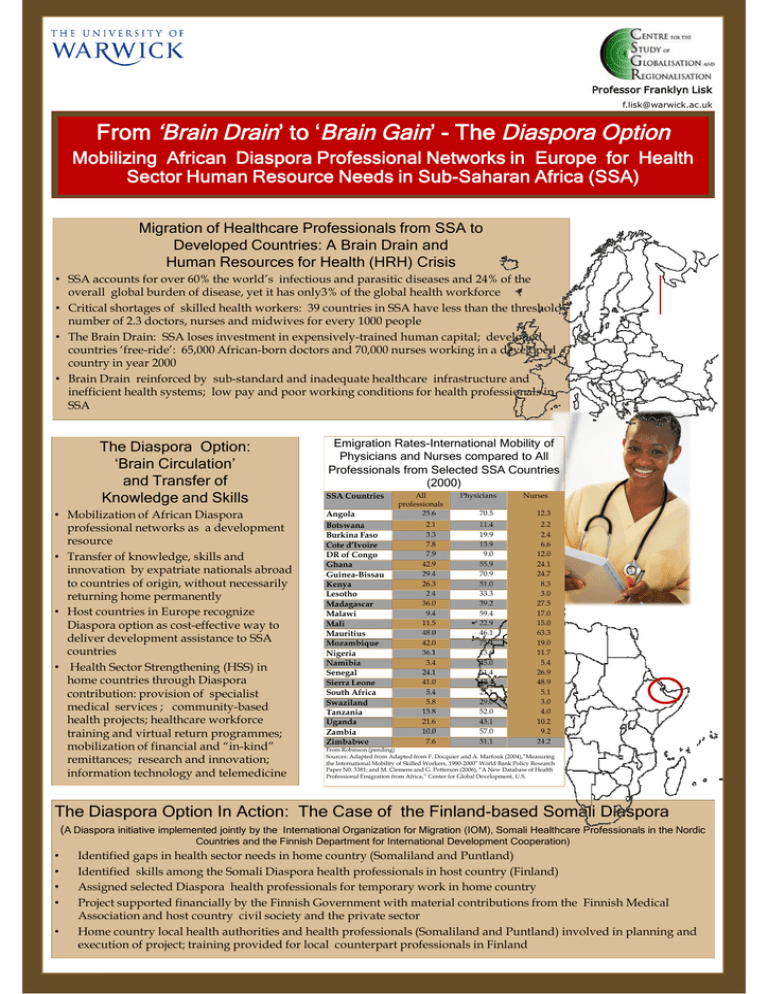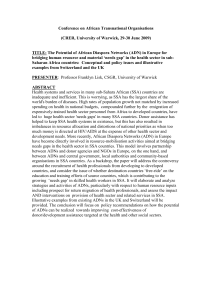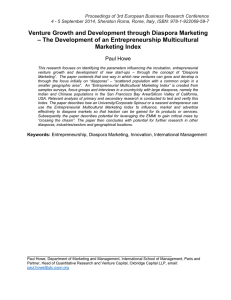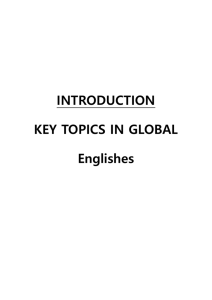From ‘Brain Drain’ to ‘Brain Gain’ - The Diaspora Option
advertisement

Professor Franklyn Lisk f.lisk@warwick.ac.uk From ‘Brain Drain’ to ‘Brain Gain’ - The Diaspora Option Mobilizing African Diaspora Professional Networks in Europe for Health Sector Human Resource Needs in Sub-Saharan Africa (SSA) Migration of Healthcare Professionals from SSA to Developed Countries: A Brain Drain and Human Resources for Health (HRH) Crisis • SSA accounts for over 60% the world’s infectious and parasitic diseases and 24% of the overall global burden of disease, yet it has only3% of the global health workforce • Critical shortages of skilled health workers: 39 countries in SSA have less than the threshold number of 2.3 doctors, nurses and midwives for every 1000 people • The Brain Drain: SSA loses investment in expensively-trained human capital; developed countries ‘free-ride’: 65,000 African-born doctors and 70,000 nurses working in a developed country in year 2000 • Brain Drain reinforced by sub-standard and inadequate healthcare infrastructure and inefficient health systems; low pay and poor working conditions for health professionals in SSA The Diaspora Option: ‘Brain Circulation’ and Transfer of Knowledge and Skills • Mobilization of African Diaspora professional networks as a development resource • Transfer of knowledge, skills and innovation by expatriate nationals abroad to countries of origin, without necessarily returning home permanently • Host countries in Europe recognize Diaspora option as cost-effective way to deliver development assistance to SSA countries • Health Sector Strengthening (HSS) in home countries through Diaspora contribution: provision of specialist medical services ; community-based health projects; healthcare workforce training and virtual return programmes; mobilization of financial and “in-kind” remittances; research and innovation; information technology and telemedicine Emigration Rates-International Mobility of Physicians and Nurses compared to All Professionals from Selected SSA Countries (2000) SSA Countries Angola Botswana Burkina Faso Cote d’Ivoire DR of Congo Ghana Guinea-Bissau Kenya Lesotho Madagascar Malawi Mali Mauritius Mozambique Nigeria Namibia Senegal Sierra Leone South Africa Swaziland Tanzania Uganda Zambia Zimbabwe All professionals 25.6 2.1 3.3 7.8 7.9 42.9 29.4 26.3 2.4 36.0 9.4 11.5 48.0 42.0 36.1 3.4 24.1 41.0 5.4 5.8 15.8 21.6 10.0 7.6 Physicians Nurses 70.5 12.3 11.4 19.9 13.9 9.0 55.9 70.9 51.0 33.3 39.2 59.4 22.9 46.1 75.4 13.6 45.0 51.4 42.4 21.1 29.0 52.0 43.1 57.0 51.1 2.2 2.4 6.6 12.0 24.1 24.7 8.3 3.0 27.5 17.0 15.0 63.3 19.0 11.7 5.4 26.9 48.9 5.1 3.0 4.0 10.2 9.2 24.2 From Robinson (pending) Sources: Adapted from Adapted from F. Docquier and A. Marfouk (2004),”Measuring the International Mobility of Skilled Workers, 1990-2000” World Bank Policy Research Paper N0. 3381; and M. Clemens and G. Petterson (2006), “A New Database of Health Professional Emigration from Africa,” Center for Global Development, U.S. The Diaspora Option In Action: The Case of the Finland-based Somali Diaspora (A Diaspora initiative implemented jointly by the International Organization for Migration (IOM), Somali Healthcare Professionals in the Nordic Countries and the Finnish Department for International Development Cooperation) • • • • • Identified gaps in health sector needs in home country (Somaliland and Puntland) Identified skills among the Somali Diaspora health professionals in host country (Finland) Assigned selected Diaspora health professionals for temporary work in home country Project supported financially by the Finnish Government with material contributions from the Finnish Medical Association and host country civil society and the private sector Home country local health authorities and health professionals (Somaliland and Puntland) involved in planning and execution of project; training provided for local counterpart professionals in Finland



